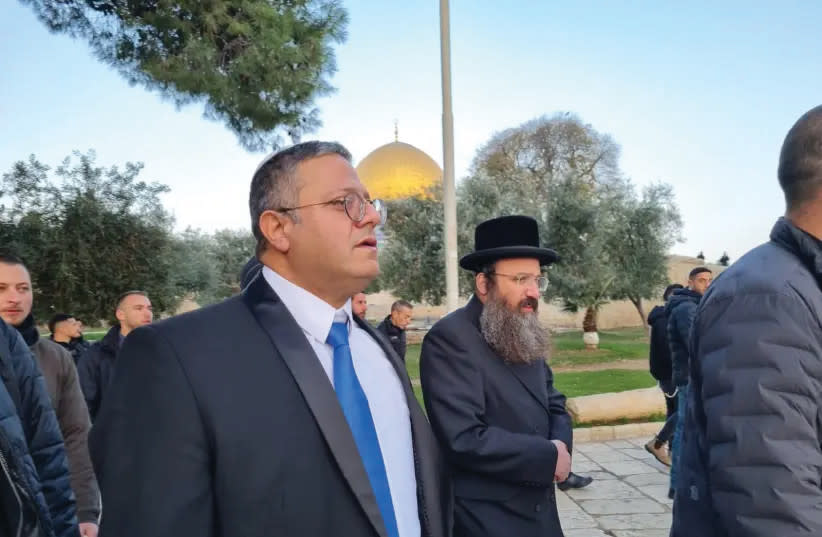King Abdullah of Jordan has announced that his country is ready for a confrontation if there is any change in the status quo in the holy places.
This statement highlights even more Israel’s lack of governance in the holiest place for the Jewish People, the Temple Mount, and even more than that, the lack of interest that the majority of the Israeli public and media have in the Temple Mount.
The average Israeli citizen celebrates the Jewish holidays faithfully, circumcises his male children and makes a bar mitzvah for them and on the other hand, is not so aware of how central the Temple Mount is in Judaism.
This Jewish site is absent from the Israeli public’s awareness due to political and media-related reasons. The Temple Mount is considered a dangerous place, a center of fanaticism and a trouble spot and therefore it is preferable to stay away from it. The best thing to do is not to relate to it at all, if possible. The reasons often quoted are religious, ideological and political, and they have been around for a long time.
After the destruction of the Second Temple, it was very difficult for Judaism to adapt itself to religious life without a temple and now it finds it hard to rid itself of the traditions that have been formed since then. The Zionist ideology was ruled by the socialist movements for whom religion was no more than an opiate for the masses. The fear of the reaction of the Muslim world concludes this list of concerns.

The mass media form our view of reality. The role of media outlets and journalists, as a professional community that mediates and structures reality, is decisive. The media frame an event and then determine the way the public will relate to it: important and interesting or not relevant as a news item.
Why do Israeli media ignore where the Temple once stood?
Why, therefore, do Israeli media ignore the place where the Temple once stood? One can see that the media’s disregard is due to two factors: The topic of the Temple Mount is considered to be outmoded, unfashionable and reactionary, leading to such tragedies as religious wars, and the fear that if Jews do anything on the Temple Mount, the entire Muslim world will unite against little Israel.
These two factors have joined together to cause the media establishment to ignore the lack of sovereignty of Israel on the Temple Mount and where there is a vacuum, someone always steps in to fill it. The vacuum of the Israeli sovereignty on the Temple Mount has led to a slow process that has created a Jordanian enclave in the holy place and since no one speaks about it, there is also much ignorance regarding it.
IF YOU ask the security forces guarding the holy place physically about the history embedded in its stones, you will see that history lessons were not the highest priority when it came to the training course for those serving in the holiest place for the Jewish people.
The journalists who mediate reality to the public are mostly Western, secular and liberal-oriented. The profile of most of the media people in Israel shows that they usually don’t have any connection to religion and its symbols. They consider these as being only a source of trouble and power struggles. It is, therefore, easy for them to adopt the political claim that the Temple Mount – the place where the Temple once stood – is a pain in the neck and that it is better not to touch it.
One hears reports regarding the Temple Mount only in the context of confrontations and violence. On the other side, the Muslim world’s strategy regarding controlling the Temple Mount is to achieve that aim gradually, step by step. That is how they eat away at Israeli sovereignty there since the Six-Day War when Israel conquered the area. The Wakf became responsible for the Temple Mount mainly because of the lack of interest of the then-defense minister Moshe Dayan in controlling the Temple Mount spiritually and practically.
Since then, every time there is some interest in Israel in the Temple Mount, even on a minor level, we immediately hear threats on the part of the Wakf that a billion Muslims throughout the world are standing ready to attack Israel. The state then beats a hasty retreat, leading to a situation where the Temple Mount is a de facto ex-territory in the heart of Israel.
Itamar Ben-Gvir’s excursions onto the Mount are also presented in an extreme context: he is depicted as a troublemaker who will bring upon us war with all Muslims. It remains to be seen whether Ben-Gvir, who already visited the mount as national security minister on Tuesday, will bring about an essential change in the attitude of the old-time Israeli judicial, political and security establishments toward the situation on the Temple Mount, resulting in significant ramifications.
One may expect that the atmosphere of change that the new minister is bringing with him will be able to reverse the gradual Jordanian and Wakf erosion and initiate more of an Israeli imprint on setting the rules, such as ending the time limitations on the presence of Jews on the Mount, opening more gates to Jews wishing to enter there beyond the present Maghariba (Moors’) Gate and allowing Jews to pray in the holy shrine, which has largely been prevented until now.
Maybe then the Israeli media will stop falling into the trap of the psychological warfare of the Jordanian Wakf, which tries to limit Israeli sovereignty in the holy place and succeeds in doing so, with no objections being voiced.
Dr. Ron Schleifer is a senior lecturer at Ariel University specializing in psychological warfare. Dr Judith Yehezkelly is a senior Israeli journalist who specializes in political communication.
